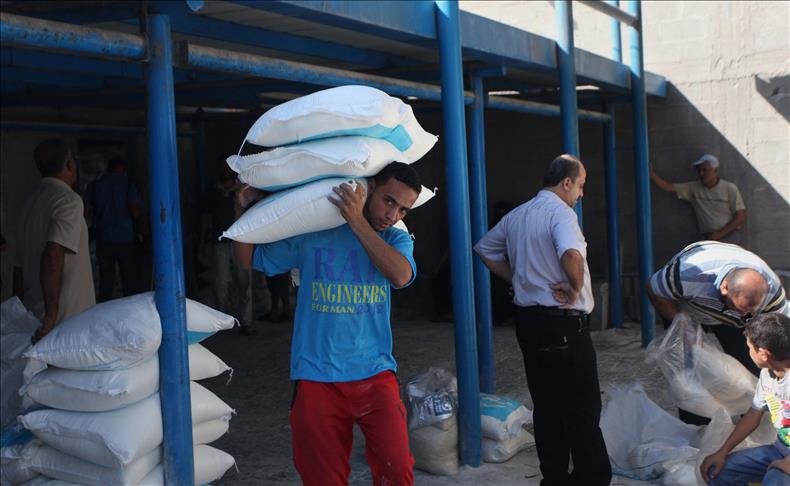
RAMALLAH
Said Duweikat, a Palestinian, enters a drugstore in the West Bank and sheepishly asks for medicine made in Israel.
He must buy the medicine, which is made by Israel's TEVA Pharmaceutical Industries, as the pharmacist told him it was only available in Israel.
This state of affairs appears to be undermining a Palestinian campaign to boycott Israeli products.
The apparent lack of local or foreign alternatives to Israeli products in Palestinian markets can be explained by Palestinian-Israeli agreements that make the self-proclaimed Jewish state the sole provider of certain commodities.
These agreements – and the fact that Israel restricts the ability of Palestinians to meet their needs from other countries – make Palestinians totally dependent on Israel, especially in terms of water, electricity, fuel, mobile phone and internet services, and medicine.
The following are Israeli-manufactured commodities that Palestinians cannot do without – despite their desire to boycott Israeli goods.
Water, electricity
Some 95 percent of the electricity consumed by Palestinians in the occupied West Bank and Gaza Strip come from Israel, according to Hesham al-Omari, director of the Jerusalem District Electricity Company – one of the largest energy firms operating in the Palestinian territories.
"The remaining 5 percent comes from Egypt and Jordan," al-Omari told Anadolu Agency.
Nevertheless, al-Omari said there was no agreement between the Palestinians and Israel preventing the former from importing electricity from other countries. This would, however, cost more money, he explained.
"The other thing is that countries like Egypt and Jordan for example are suffering from electricity shortages," he added.
He went on to note that the Palestinians spend some $880 million every year to purchase electricity from Israel.
According to al-Omari, the same applies to water. He pointed out that the Palestinians buy almost 70 percent of their water needs from Israel.
He added that Israel controlled around 90 percent of the water sources in the occupied West Bank, according to an earlier study conducted by the Palestinian Economic Policy Research Institute.
AA could not obtain comments from Palestinian water authority officials regarding official figures on Palestinian water imports from Israel.
Fuel
Palestinians in the occupied West Bank and the Gaza Strip consume roughly 800 million liters of fuel every year, Nizar al-Jaabari, deputy head of fuel stations in Palestine, told AA.
He said the Palestinians spent around $1.2 million a year to buy fuel in light of protocols signed in 1994 between the Palestinians and the Israeli government.
The same agreement gives the Palestinians the right to buy fuel from neighboring countries, provided the fuel meets European standards observed by Israel.
He said, however, that Egyptian and Jordanian fuel was not up to Israel's standards.
"That's why we can only buy fuel from Israel," al-Jaabari asserted.
Drugs, internet
Drugstores in the Palestinian territories contain some medicine and medical supplies made in Israel, for which there are no local or foreign alternatives.
"We're talking about 60 kinds of medicine and medical supplies, at least," one Palestinian Health Ministry official said on condition of anonymity.
Israel, meanwhile, has not allowed Palestinian communications companies to obtain "third-generation" wireless technology.
This has forced Palestinians to resort to Israeli companies for internet services.
According to the Palestinian Statistics Agency, the Palestinians imported some $1.5 billion worth of Israeli commodities in the first five months of this year.
Last year, the agency added, Palestinians purchased Israeli commodities worth a total of $3.5 billion – including some $500 million worth of goods imported from Jewish settlements.
Germany to send humanitarian aid to Gaza and Iraq
Germany has announced to send 40 million euro humanitarian and financial assistance to war-ravaged Gaza and Iraq to help ease civilian suffering in these regions.
Economic Cooperation and Development Minister Veronika Ulbert said in a written statement Wednesday that Germany would provide 20 million euro financial aid to Gaza.
"This financial support will be used particularly for re-establishing Gaza's drinking water substructure and sewage system which are completely damaged," Ulbert said.
She said that psychological and social support would be provided for Gazan civilians who suffered severe trauma.
A devastating Israeli offensive against the Gaza Strip has left at least 1,951 Palestinians dead – the vast majority of them civilians – and more than 10,000 injured since July 7.
Ulbert also confirmed that Germany would send an additional 20 million euro aid package for the Iraqi people displaced by the attacks and persecutions by the self-proclaimed Islamic State militants.
The minister stressed that they aimed to improve the infrastructure for refugees and to supply drinking water.
"These aids will be provided directly, quickly and without encountering any bureaucratic obstacle," she added.
Ulbert also announced that they would collaborate with World Food Programme, the United Nations Children's Fund and non-governmental organizations in north of Iraq.
Germany had announced a 8.5 million euros aid package for the blockaded Gaza Strip on July 31.
Anadolu Agency website contains only a portion of the news stories offered to subscribers in the AA News Broadcasting System (HAS), and in summarized form. Please contact us for subscription options.

